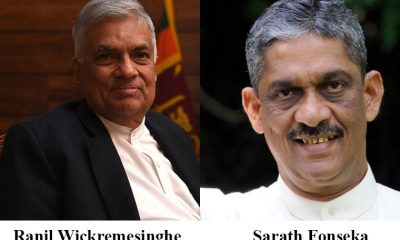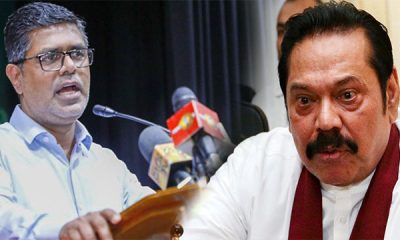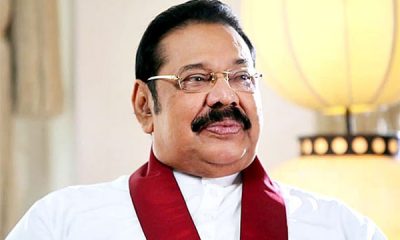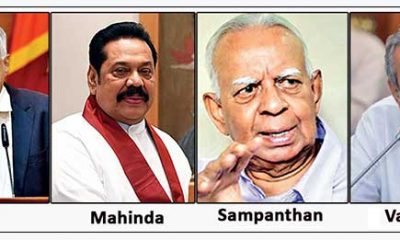News
ISBs amounting to USD 10,000 mn issued by Yahapalana govt. ruined economy, says Mahinda
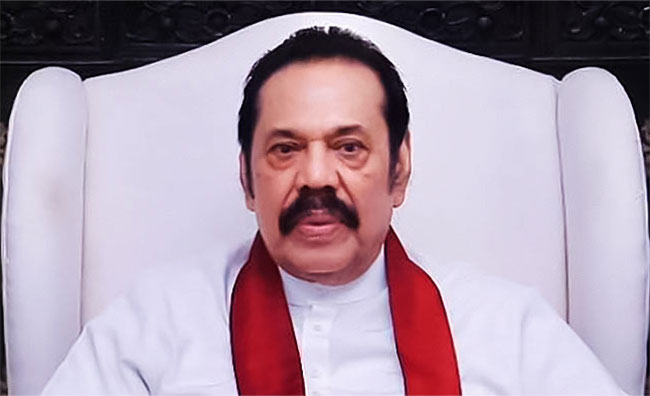
SLPP leader and former President Mahinda Rajapaksa, MP yesterday (20) alleged that USD 10,000 mn in new ISBs (International Sovereign Bonds) issued between 2015 and 2019 by the Yahapalana administration, comprising the UNP and the SLFP, had debilitated the economy.
Rajapaksa said that when he was voted out in January 2015, the outstanding ISB debt was only USD 5,000 mn. The Gotabaya Rajapaksa government ( 2020-2022) paid off USD 2,500 million in outstanding ISBs, which meant that only USD 2,500 million in ISBs now remained from his era.
The following is the text of the statement: Around 40 professional associations and trade unions representing vital sectors of the economy and the public services have been agitating for a reduction in income taxes for many months. In the meantime, the high tax burden has precipitated an exodus of educated and highly trained professionals from the country giving rise to a new crisis. Following increases in the VAT through the Budget for 2024, tax policy is set to become a major political issue in 2024.
The call to reduce taxes is based on solid economic principles. When taxes are low, both individuals and corporations have more money to spend and invest and this acts as a driver of the economy. Low taxes was a cornerstone of my government’s policy and it made a major contribution to the unbroken nine-year economic boom that this country experienced between 2006 and 2014. So as not to burden the people with taxes, my government of 2006-2014 restricted the overall year-on-year increase in government tax revenue to around Rs. 100 billion a year. Through careful economic management, my government reduced the debt to GDP ratio from 90% at the end of 2005 to 69% at the end of 2014 thus ensuring the feasibility of the low tax regime.
However, over the past several years there have been well-funded propaganda campaigns promoting a headlong and mindless opposition to everything, even remotely associated with the name ‘Rajapaksa,’ including the low tax policy. In order to blacken the very concept of low taxes, some even claimed that the Rajapaksa-led governments reduced taxes to help cronies. That is an outright lie. Tax exemptions can be granted only under laws like the Board of Investment Act and the Strategic Development Projects Act in order to attract investors for specified projects.
After 2015, the low tax regime was rejected in favour of a high tax regime. Unsurprisingly, Sri Lanka’s growth rate declined precipitously after 2015 ending up at 0.2 below zero by 2019. Due to bad economic management, the period from 2015 to 2019 saw an increase in taxes while at the same time experiencing a precipitous increase in foreign debt. When I was voted out in January 2015, the outstanding International Sovereign Bond debt was only USD 5,000 million. The Gotabaya Rajapaksa government of 2020-2022 paid off USD 2,500 in outstanding ISBs which means that only USD 2,500 million in ISBs now remains from my era.
Over USD 10,000 million in new International Sovereign Bonds were taken between 2015 and 2019. Hence we still have an outstanding ISB stock of USD 12,500 million. It was this USD 10,000 million in new ISBs taken between 2015 and 2019 that broke the back of our economy. When the Covid-19 pandemic struck Sri Lanka a few months after I became Prime Minister at the end of 2019, we wrote to the IMF in March 2020 asking for emergency assistance. The IMF wrote back saying that our debt levels disqualifies us from their emergency relief package.
They then proposed a raft of conditions that would qualify us for IMF assistance but those conditions would have made it impossible for us to face the Covid-19 threat in the manner that we did in 2020 and 2021. The present government is now implementing stringent conditions as part of an IMF programme. Thus one thing led to another, finally resulting in a situation where we now see top professionals holding multiple university degrees and professional qualifications agitating on the streets, demanding a reduction in taxes.
The SLPP which I lead is a part of the government. However the present Head of the Government and Head of State is the leader of a different political party with different policies. In a situation where this country was faced with complete anarchy, Parliament elected a President to serve the remainder of former President Gotabaya Rajapaksa’s term. The new President successfully restored law and order to the country. He is now directing government policy as the Executive President. At this moment, the primary duty of the SLPP is to ensure a stable government until the next national elections.
In the future, every member of the public should pay special attention to the tax policy and the past economic practices of the political party they vote for. As elections draw closer, once again we see attempts to hustle people blindly and unthinkingly in various directions through ramped up propaganda and social media hysteria. Whatever decision the people make at the next elections should be based on rational thinking, proper facts and correct data. We are still living through the consequences of January 2015 and this country cannot afford another mistake like that again.”
News
US sports envoys to Lanka to champion youth development

The U.S. Embassy in Colombo welcomed the U.S. Sports Envoys to Sri Lanka, former National Basketball Association (NBA) and Women’s National Basketball Association (WNBA) players Stephen Howard and Astou Ndiaye, from June 8 through 14.
The Public Diplomacy section of the U.S. Embassy said that it would launch a weeklong basketball program intended to harness the unifying power of sports, made possible through collaboration with Foundation of Goodness and IImpact Hoop Lab.
While in Sri Lanka, Howard and Ndiaye, both retired professional basketball players, will conduct a weeklong program, Hoops for Hope: Bridging Borders through Basketball. The Sports Envoys will lead basketball clinics and exhibition matches and engage in leadership sessions in Colombo and Southern Province for youth aged 14-18 from Northern, Uva, Eastern and Western Provinces, offering skills and leadership training both on and off the court. The U.S. Envoys will also share their expertise with the Sri Lanka Basketball Federation, national coaches, and players, furthering the development of basketball in the country. Beyond the clinics, they will collaborate with Sri Lankan schoolchildren to take part in a community service project in the Colombo area.
“We are so proud to welcome Stephen and Astou as our Sports Envoys to Sri Lanka, to build on the strong people-to-people connections between the United States and Sri Lanka,” said U.S. Ambassador Julie Chung. “The lessons that will be shared by our Sports Envoys – communication, teamwork, resilience, inclusion, and conflict resolution – are essential for leadership development, community building, equality, and peace. The U.S. Sports Envoy program is a testament to our belief that sports can be a powerful tool in promoting peace and unity.”
News
Rahuman questions sudden cancellation of leave of CEB employees

SJB Colombo District MP Mujibur Rahuman in parliament demanded to know from the government the reasons for CEB suspending the leave of all its employees until further notice from Thursday.
MP Rahuman said that the CEB has got an acting General Manager anew and the latter yesterday morning issued a circular suspending leave of all CEB employees with immediate effect until further notice.
“We demand that Minister Kanchana Wijesekera should explain this to the House. This circular was issued while this debate on the new Electricity Amendment Bill was pending. There are many who oppose this Bill. The Minister must tell parliament the reason for the urge to cancel the leave of CEB employees,” the MP said.However, Speaker Mahinda Yapa Abeywardena prevented Minister Wijesekera responding to the query and said that the matter raised by MP Rahuman was not relevant.
News
CIPM successfully concludes 8th Annual Symposium

The Chartered Institute of Personnel Management (CIPM) successfully concluded the 8th Annual CIPM Symposium, which took place on 31st May 2024. Themed “Nurturing the Human Element—Redefining HRM in a Rapidly Changing World,” the symposium underscored the pivotal role of human resource management (HRM) in today’s dynamic global landscape. Since its inception in 1959, CIPM has been dedicated to advancing the HR profession through education, professional development, and advocacy, solidifying its position as Sri Lanka’s leading professional body for HRM.
Ken Vijayakumar, the President of the CIPM, graced the occasion as the chief guest. The symposium commenced with the welcome address by the Chairperson, Prof. Arosha Adikaram, followed by the Web Launch of the Symposium Proceedings and Abstract Book by the CIPM President. The event featured distinguished addresses, including a speech by Chief Guest Ken Vijayakumar, President of CIPM, and an address by Guest of Honor Shakthi Ranatunga, Chief Operating Officer of MAS Holdings Pvt. Ltd., Sri Lanka.
The symposium also featured an inspiring keynote address by Prof. Mario Fernando, Professor of Management and Director of the Centre for Cross Cultural Management (CCCM) at the University of Wollongong, Australia.
Vote of Thanks of the inauguration session was delivered by Dr. Dillanjani Weeratunga, Symposium Co-chair.
The symposium served as a comprehensive platform for researchers to present their findings across a wide range of critical topics in HRM. These included Cultural Diversity and Inclusion, Talent Development and Retention, Ethical Leadership and Corporate Social Responsibility, Adapting to Technological Advancements, Mental Health and Well-being at Work, Global Workforce Challenges, Employee Empowerment, and Reskilling and Upskilling.
The plenary session was led by Prof. Wasantha Rajapakse. Certificates were awarded to the best paper presenters during the valedictory session, followed by a vote of thanks delivered by Kamani Perera, Manager of Research and Development.
The annual symposium of CIPM was a truly inclusive event, attracting a diverse audience that spanned undergraduates, graduates, working professionals, research scholars and lecturers. This widespread interest highlights the symposium’s significance in the field of HRM, offering a unique opportunity for everyone to network and learn from scholarly brains.The CIPM International Research Symposium was sponsored by Hambantota International Port, Sri Lanka Institute of Information Technology (SLIIT), E B Creasy & Co. PLC, and Print Xcel Company.




